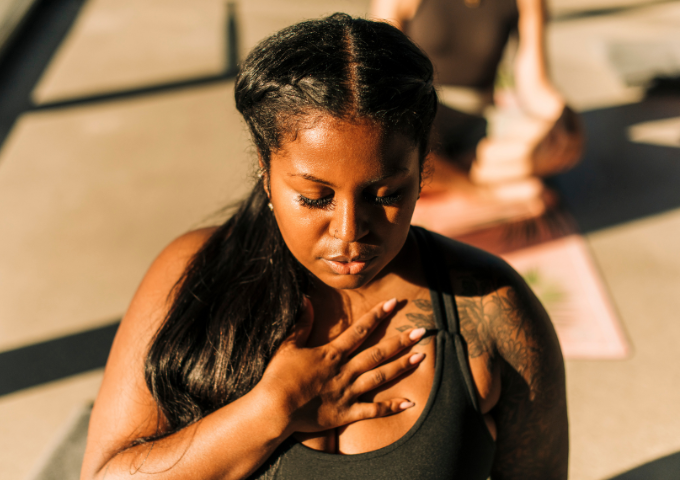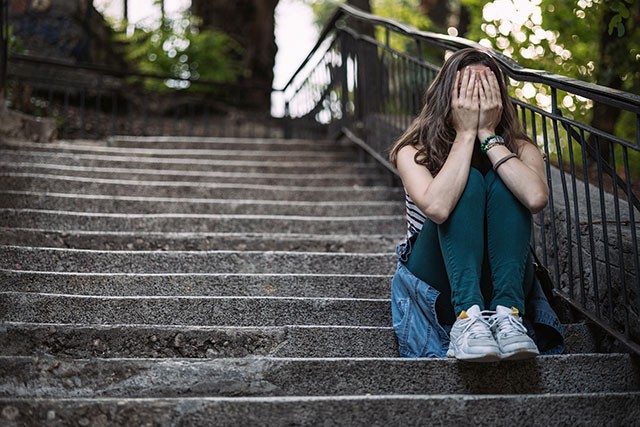Learn about the signs and symptoms of anxiety and what can cause anxiety so that you can get the support you need.
What is anxiety?
It is normal to feel anxious now and then. If you feel worried, jittery or nervous before public speaking, going on a date, attending a job interview, or heading into an unfamiliar situation – that’s quite normal. Many people get ‘butterflies’ in their stomachs before doing something stressful. These feelings are usually short-lived and go away once the event is over.
Anxiety is when those negative feelings last for a long time. The constant worry either doesn’t go away, or you start to feel it for seemingly no specific reason.
Anxiety can be considered a mental health condition when the symptoms become chronic and severe and negatively impact your daily life. When you have anxiety, your symptoms may prevent you from doing your daily tasks, going to work or school, keeping up with social commitments, maintaining healthy relationships, and looking after yourself.
If you’re struggling with feelings of anxiety, SuicideLine Victoria offers free phone and online counselling 24/7. Call 1300 651 251 or click the chat button on the right.
Types of anxiety disorders
Anxiety is one of the most common mental health conditions in Australia. According to mental health data from the Australian Bureau of Statistics, 17% of Australians had an anxiety disorder over a 12-month period, and nearly a third will experience an anxiety condition in their lifetime.[1]
There are different types of anxiety disorders, and a person can have more than one. Below are some of the more common anxiety disorders in Australia:
- Generalised anxiety disorder – excessive and persistent worry about everyday aspects of life, rather than a specific stressful event.
- Social anxiety disorder (also called social phobia) – fear of being judged, observed, or performing in front of others, which can lead to avoiding social situations.
- Specific phobia – extreme and long-lasting fears of specific objects, activities, or situations, such as fear of animals, heights, flying, injections, or small spaces.
- Panic disorder – recurring and unexpected panic attacks, which are sudden rushes of intense fear accompanied by physical symptoms like heart palpitations, shortness of breath, and dizziness.
Post-traumatic stress disorder (PTSD) and obsessive-compulsive disorder (OCD) were previously classified as anxiety disorders but are now categorised separately. Anxiety can be present in both PTSD and OCD.
With the right support, anxiety is treatable. If you are experiencing anxiety, you can speak to your GP or a mental health professional about treatment options.
“It’s normal to feel worried about stressful situations. However, if the anxiety stays with you after the situation or event has passed, it may affect your day-to-day life.”
Symptoms of anxiety
Anxiety symptoms may not be the same for everyone and can vary depending on the type of anxiety you are experiencing.
Below are some of the more common anxiety symptoms.
Common symptoms of anxiety – emotional
- Worrying about the past or future
- Feeling overwhelmed with negative thoughts
- Feeling self-conscious about other people looking or talking about you
- Experiencing repetitive or excessive thoughts.
Common symptoms of anxiety – physical
- The urge to fidget or pace
If you have anxiety symptoms, you may start to avoid doing the things you once enjoyed. You may also avoid friends and family, which can lead to loneliness. Remember that anxiety can be treated, and there is help available. You can speak to your GP, a health professional, or call 1300 651 251 to speak to a SuicideLine Victoria counsellor.
Causes of anxiety
There are a number of risk factors that can contribute to anxiety, from past experiences to life stressors. They differ from person to person, and what may cause one person to experience anxiety may not impact another person.
Below are some of the common risk factors.
Common causes of anxiety – childhood and past experiences
- Growing up in an unstable or emotionally unsupportive environment
- Having anxious parents or family members (learning anxious behaviours and thought patterns)
- Unpredictable reactions or emotions from people close to us
- Constant criticism or pressure during formative years
- Childhood bullying or feeling excluded.
Common causes of anxiety – current circumstances
- Stressful time at work or school
- A major life event (e.g. having a new baby, moving, retirement)
Common causes of anxiety – traumatic events
- Grieving the loss of a loved one
- Experiencing or witnessing a traumatic or life-threatening event.
Getting help for anxiety
If you are experiencing anxiety and it is disrupting your daily life, you should seek support and help as soon as you can.
Self-help strategies for managing anxiety
Depending on the severity of your anxiety, you can consider some self-help strategies to help manage it in the short term. The Australian Psychological Society has some tips to help you cope when you are facing a difficult situation: [2]
- Check your self-talk – When we are upset, we sometimes say negative or unhelpful things to ourselves, such as, “I am terrible at this” or “I am hopeless”. Negative self-talk can increase our anxiety. Try to notice what you say to yourself and reframe negative thoughts into positive self-talk, such as, “I am coping well given what is happening”.
- Keep things in perspective – When we feel anxious, we may see things as worse than they actually are. To keep things in perspective, take a step back and look at one of your worries in the bigger scheme of your life. Consider if you are getting ahead of yourself by assuming something terrible will happen. Is the outcome certain to happen, possible or quite unlikely? If the worst were to happen, what could you do about it? You can also think about how you would cope, as this can help to put things into perspective.
- Practise relaxation, meditation or mindfulness – Practising relaxation, meditation, and mindfulness regularly will allow your body and nervous system to routinely settle and readjust to a calm state. If you need help getting started, Smiling Mind is an app with self-guided mindfulness and meditation sessions.
- Look after your health – Eating well, exercising regularly, maintaining good sleep habits, and reducing unhealthy coping behaviours can help you manage anxiety.
Professional and peer support options
In addition to self-help strategies, professional support is available:
- Talk to your GP – Visiting your doctor is often a good first step to getting support. Your doctor can conduct an assessment, discuss treatment options, and provide referrals. Be honest about your symptoms and how they are impacting your life.
- Mental health treatment plan – Your GP can assess whether you need a mental health treatment plan. Your plan will have healthcare goals and treatments. The plan may also include referrals to healthcare professionals, such as psychologists, for further treatment. Medicare rebates are available for people who have been diagnosed with a mental health disorder and have a mental health treatment plan.
- Psychological therapy – Psychological therapy can be used to treat anxiety and is provided by psychologists, psychiatrists, and other mental health professionals with specialised training. Two examples of treatment techniques that are used for anxiety are cognitive behavioural therapy (CBT) and acceptance and commitment therapy (ACT).
- Peer support group – Connecting with others who experience anxiety can provide understanding and new coping strategies. Beyond Blue and SANE have online peer forums.
- Free helpline – SuicideLine Victoria has professional counsellors available 24/7. Call 1300 651 251. If you are experiencing perinatal anxiety, PANDA has a national helpline that is available Monday to Saturday for expecting and new parents – call 1300 726 306. Lifeline is also available 24/7 for crisis support on 13 11 14.
- Online mental health tools – MindSpot is a free, digital mental health clinic that provides psychological assessments, teletherapy, and online treatment courses. Black Dog Institute myCompass is a free online tool that can help you identify unhelpful thoughts, feelings, and behaviours, and learn strategies to deal with them.
If you are already seeing a counsellor, psychologist or psychiatrist, speak to them about your anxiety and be honest about how you are coping.
SuicideLine Victoria counsellors can help you work through your anxiety. Call us on 1300 651 251 or click the chat button on the right to chat with a counsellor online. Our service is free, and you do not need a referral.
If it is an emergency, please call 000.
References
[1] Australian Bureau of Statistics. (2020-2022). National Study of Mental Health and Wellbeing. ABS. https://www.abs.gov.au/statistics/health/mental-health/national-study-mental-health-and-wellbeing/latest-release.
[2] Australian Psychological Society https://psychology.org.au/for-the-public/psychology-topics/anxiety/tips-to-manage-anxiety









